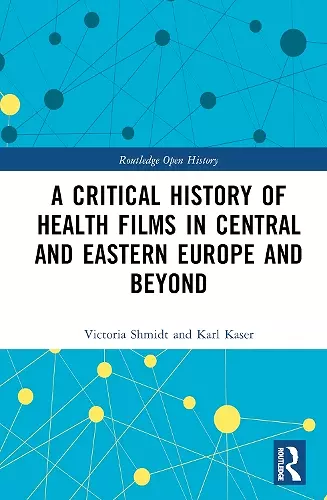A Critical History of Health Films in Central and Eastern Europe and Beyond
Karl Kaser author Victoria Shmidt author
Format:Hardback
Publisher:Taylor & Francis Ltd
Published:21st Dec '23
Currently unavailable, and unfortunately no date known when it will be back

The burgeoning scholarship on Western health films stands in stark contrast to the vacuum in the historical conceptualization of Eastern European films. This book develops a nonlinear historical model that revises their unique role in the inception of national cinematography and establishing supranational health security.
Readers witness the revelation of an unknown history concerning how the health films produced in Eastern European countries not only adopted Western patterns of propaganda but actively participated in its formation, especially with regard to those considered “others”: Women and the populations of the periphery. The authors elaborate on the long “echo” of the discursive practices introduced by health films within public health propaganda, as well as the attempts to negate and deconstruct such practices by rebellious filmmakers. A wide range of methods, including the analysis of the sociological biographies of filmmakers, the historical reconstruction of public campaigns against diseases and an investigation into the production of health films, contextualizes these films along a multifaceted continuum stretching between the adaptation of global patterns and the cultivation of national authenticities.
The book is aimed at those who study the history of film, the history of public health, Central and Eastern European countries and global history.
The Open Access version of this book, available at http://www.taylorfrancis.com, has been made available under a Creative Commons Attribution (CC-BY) 4.0 International license.
Special mention in the Janovics Center Award for Outstanding Humanities Research in Transnational Film and Theatre Studies, 2023
"The Jury commends the novelty of the topic of the monograph and the relevance of the way in which it analyzes its primary material. Shmidt and Kaser’s effort originally approaches propaganda films about health from East-Central Europe as relevant contributions to understanding important transformations in global conceptions of governmentality. The monograph effectively addresses a substantial gap in the field and shifts away from usual bodies of work focused on Western countries’ institutions and film productions. By combining a wide range of methodologies, film analysis, the history of medicine, cultural anthropology, and political theory, it is exceptionally interdisciplinary. By looking at different actors involved in making health films, it shows complicated entanglements between the local and the global. This approach enriches our knowledge of the role cinema played in contributing to and exerting biopower, while giving full account of previously neglected areas. The case studies reveal early cinematic tools of “othering,” especially along the gender, class, and race spectrum."
"...thoroughly elucidates the political, medical, anthropological, sociological, and intersectional elements of its titular topic. Schmidt and Kaiser utilise historicised critical heritage and public health lenses to unpack the salience of Central and Eastern European health films as endogenous responses to public health conditions, regional relations, and cinematic trends." - European Journal of Communication
"This interdisciplinary book bridges the fields of film history, public health, and Central and Eastern European studies, providing readers with a nuanced understanding of health films and their role in shaping public health perceptions and policies in Central and Eastern Europe." - Anelia Kassabova, Bulgarian Academy of Sciences, Balkanistic Forum
ISBN: 9781032215143
Dimensions: unknown
Weight: 453g
272 pages